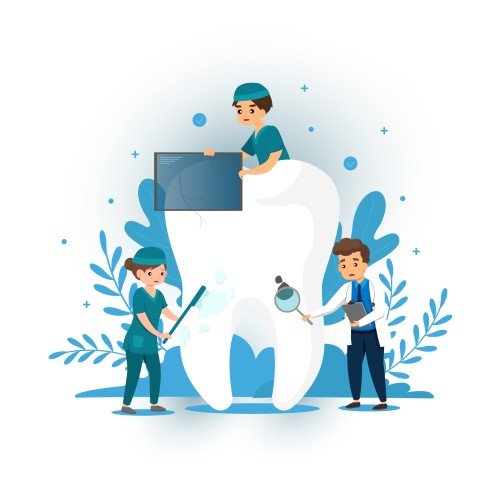If you are looking for a dental check-up in Vadodara then you are at the right place to visit. Baroda Dental Clinic Provide Complete Oral and Dental checkups at affordable rates
Oral Wellness is an essential factor for a full-fledged part of life, for well-being and general health.
It is substantial to see your dentist usually to maintain good oral health. Learn what dental check-up is and how often you should be.
Healthy eating, regular dentistry, and daily personal oral hygiene practices can prevent oral infection. Baroda Dental Clinic offers you a complete solution for your oral check-up. Proper dental treatment is essential because it helps keep your teeth and brain healthy. You should visit a dental hospital at least every six months or recommend by your dental professional.

Steps involved in Dental Checkup
In most cases, the dental hygienist and dentist follow the following steps. But in some cases, a dentist can expand or narrow the check-up by seeing the patient’s condition.
Step 1: Questions about your oral health
First of all, the dentist will ask you general questions about all the activities happening in your mouth. As such, “When did you ever have a dental check-up?” “Is there any toothache?” When did you finally get an x-ray? If done?
Discuss any dental hygiene problems discovered in recent time, and how to brush and show more effectively if necessary.
Step 2: Examination
Now, the dental expert will inspect your entire mouth. In which all issues would be check related to your teeth, gum, cavity, and bones.
We will also check any appearance of brain swelling in any areas, swelling of the mouth, and redness. Finally, they will measure the periodontal pocket of your mouth, which is the top spacing of the gum line and where the gum tissue connects to the tooth.
Discuss any dental problems discovered by your hygienist or dentist
Topic Covered
- Observe your full health and oral hygiene
- Observe your tooth decay, root rot, and risk of gum or bone disease
- To inspect your need for restoration or replacement of teeth
- Inspect your bite and jaw for problems
- Remove stains or deposits on your teeth
- Showcase the right cleaning techniques for your teeth
- Evaluate your need for fluoride
Step 3: X-Ray(If Required)
After verifying your mouth correctly. If there is any problem, the dentist will point you to X-rays. The x-ray might take according to your dental condition. Dental X-RAY is needed to monitor the place where the dentist has been unable to look forward.
Step 4: Results and advice
After the dental examination is complete, your dentist will tell you what’s going on in your mouth and advise you on the next step. Sometimes it involves scheduling other dental appointments for the procedure, while other times, your dentist will advise you on what to do at home to improve oral health.
You must listen to this advice and go ahead so that you can be sure that your next check-up can be the best. Your hygienist can provide additional instructions to follow at home, based on your exam results. Do not hesitate to ask your hygienist for your suggestions about brushing or flossing or general care questions about your teeth and brain.
Know your Dental Experts!
Have a routine preventative check-up schedule with your hygienist. It helps you prevent not only tooth decay and periodontal disease but also avoid expensive procedures and extra time in the dental chair.
There are two parts to a regular dental visit – check-up, or examination and the washing, or oral treatment.
At the dental check-up, your dental expert will check for cavities. X-rays might be taken to identify cavities between your teeth. The exam will also include a check for plaque and tartar on your teeth. The plag is a transparent, sticky layer of bacteria. If it not removed can harden and become tartar. You cannot remove tartar with brushing and flossing. If plaque and tartar build-up on your teeth, they can cause oral diseases.
Next, We will review your gums.
The dentist will go with a unique tool to estimate the depth of the spaces between your teeth and gums. With healthy gums, the areas are unaffected. When people have gum disease, the spaces may become lower. The check-up should also include a careful examination of your tongue, throat, face, head, and neck.
Daily teeth Prevention at Home
A regular home prevention cycle usually consists of cleaning at least twice a day and flossing at least once per day. But did you know there are other tools to make taking care of your mouth a little lighter? Depending on your needs, there are special toothpaste, rinses, and even flossing aids that can help you keep your smile bright and healthy.
Baroda Dental can help you discover the best tools to improve your daily hygiene routine. We make sure that your professional cleaning appointments are shorter and less stressful.
Another essential part of your oral health is your diet. Acidic foods and drinks can erode paint just as a balanced diet can help keep your teeth and gums strong and healthy.
Regular professional exams and cleanings, a dedicated at-home hygiene routine, and a healthy, balanced diet can help prevent minor issues from becoming major procedures.
